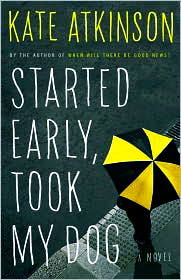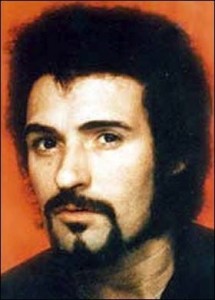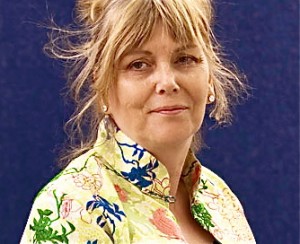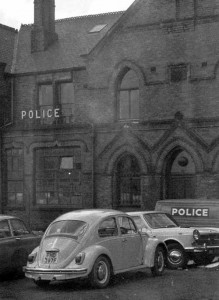“Everyone has a killer inside them just waiting to get out, some more patient than others.”
Howeve r good Kate Atkinson’s three previous Jackson Brodie novels have been, they were just the warm-up for this one. Though they are often called “mysteries” because the main character, Jackson Brodie, is a private investigator, Atkinson’s novels are far more character-driven than the norm, and more literary in execution–intriguing on several levels simultaneously. In the course of the three previous novels (Case Histories, One Good Turn, and When Will There Be Good News), Jackson Brodie has become a broader character, and in this one, his inner life is at least as important as the plot with which it intersects.
r good Kate Atkinson’s three previous Jackson Brodie novels have been, they were just the warm-up for this one. Though they are often called “mysteries” because the main character, Jackson Brodie, is a private investigator, Atkinson’s novels are far more character-driven than the norm, and more literary in execution–intriguing on several levels simultaneously. In the course of the three previous novels (Case Histories, One Good Turn, and When Will There Be Good News), Jackson Brodie has become a broader character, and in this one, his inner life is at least as important as the plot with which it intersects.
Like so many noir investigators, Brodie has always had a problem with alcohol and women, with whom he has always looked for escape from some of the underlying miseries of his life. Married twice and “almost married” to a woman who eventually fleeced him out of a large bequest, Brodie can be forgiven for being cynical about people and their motives. He has two children, one of whom he does not see, and the other of whom lives with a former wife who has refused to acknowledge that the child is his. He recognizes that “He [i]s drifting, a tourist in his own country.” Though he has tried to amuse himself with literature, he has concluded that “the great novels of the world were about three things – death, money and sex. Occasionally a whale.” The one characteristic which keeps Brodie (and the reader) going is his outrage about the injustices he sees all around him, with his strongest calumny directed toward those who take advantage of children.
In Started Early, Took My Dog, which takes place in Leeds, West Yorkshire, several plot lines begin before the entrance of Brodie. The starving, almost dead child of a prostitute is found in an apartment with the three-weeks dead body of the mother in 1975. The child is adopted privately with the aid of a social worker who obeys her own “rules.” The other story lines take place in the present. Two thugs have arranged to kidnap a child in Munich. A female former police superintendent in Leeds saves a child from being abused, then offers to buy the child from the prostitute who has been dragging her through the streets. A senile actress in a TV serial, who is also a kleptomaniac, sees a crime that she does not understand. Amid these beginning plot lines, Jackson Brodie sees a small dog being horribly abused by a muscleman and saves the dog, which quickly wiggles its way into his life and heart.
What follows is an intriguing story of identity, including Jackson Brodie’s own identity, as characters who were orphaned and/or adopted try to understand the past and make connections. Brodie himself has never recovered from the death of his sister Niamh, who was strangled when he himself was a child, one of several deaths which decimated his family before he had even reached his teen years. As several adoptees search for the truth, five members of the police department, who know the truth, find it in their own interests to keep their mouths shut. Jackson becomes involved when he is hired to try to find the parents of one of these adoptees, and his investigation runs parallel to the story of Tracy Waterhouse, the police superintendent who offered to buy a child.
The novel is complex, with a few threads left open at the end, suggesting avenues for further exploration in succeeding Atkinson novels, but Brodie becomes an even more interesting and sympathetic character, one whom the reader of the three previous Jackson Brodie novels will begin to understand even more fully. Though some of Atkinson’s novels have had threads of dark humor in them, this one is played “straight,” its serious story line obviously not a joking matter.
Where Atkinson’s irrepressible humor does come through, however, is in her style. Atkinson includes more literary references per page, often humorously, than most other writers have in an entire novel. These fit into the narrative so smoothly that it is easy to overlook them. In one ten-page sequence near the beginning, for example, Jackson comments on the changes in the country, remarking to himself that “this was no country for old men.” Two pages later, he thinks about his sister, who was seventeen when she was killed: “His sister could not stop for death, so he had, very kindly, stopped for her.” When he looks into the mirror of the car, while driving to revisit a farm where he spent a happy summer with foster parents, he comments on his own “lean and hungry look,” and a few pages later, one of his ex-wives, in talking about marriage, refers to “bare ruined choirs and all that.” In a mere ten pages, Atkinson has made references to Cormac McCarthy, Emily Dickinson (who seems to be a favorite throughout), to Shakespeare’s Julius Caesar and to his Sonnet 73 on death:
That time of year thou mayst in me behold
When yellow leaves, or none, or few, do hang
Upon those boughs which shake against the cold,
Bare ruined choirs, where late the sweet birds sang.
Birth, love, aging, and death are constant themes here as several adults, including Jackson Brodie, try to come to terms with their lives as children and find peace. Some children have been used as pawns, some have been ignored, some have been abused, and some, a fortunate few here, are loved unconditionally. The biggest questions raised by Atkinson are how some children manage to overcome their sad childhoods, and whether the social system is more geared to helping them or the adults who run it. Ultimately, a child is dependent on his/her own inner resources, if s/he can find them. Some, like Jackson Brodie, are still looking for answers but still have hope—“Hope is the thing with feathers/That perches in the soul/And sings the tune without the words/ and never stops—at all.” (Emily Dickinson)
Photos, in order: The author’s photo by Marco Secchi/Rex Features is from http://www.guardian.co.uk
The photo of Leeds, where most of the action takes place, appears on http://www.tripadvisor.com
The old Millgarth Police Station in Leeds, built in 1878, was closed in January, 1976, shortly after the earliest action of this novel takes place, and a new station was opened. http://www.leodis.net
Roundhay Park, in Leeds, where Tracy takes Courtney for some fun, is from  http://travelrat.wordpress.com
http://travelrat.wordpress.com
Peter Sutcliffe (right), the Yorkshire Ripper, who figures in this novel, admitted killing thirteen women and attempting to kill seven others between 1975 and 1980. He was convicted and sentenced to life imprisonment. All attempts at parole have been rejected. His photo is from http://www.thesun.co.uk
Also in the Jackson Brodie series: CASE HISTORIES (#1), ONE GOOD TURN (#2), WHEN WILL THERE BE GOOD NEWS (#3) , BIG SKY (#5)




